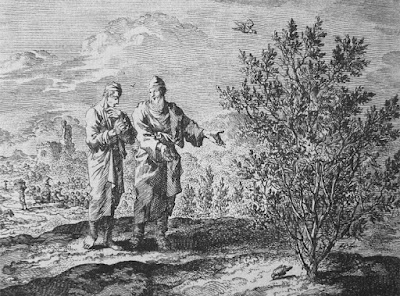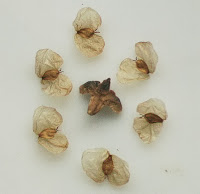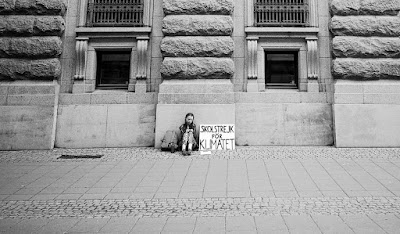Short-circuiting the parable of the mustard seed—a harvest meditation giving thanks for all the children involved in the School Strike for Climate movement
 |
| Jan Luyken from the Bowyer Bible. Photo: Harry Kossuth |
INTRODUCTION
Today is our Harvest Festival, a time when, as the author of Exodus in Tyndale’s memorable English we give thanks for reaping ‘the first fruits of thy labours, which thou hast sown in the field: and the feast of ingathering, in the end of the year: when thou hast gathered in thy labours out of the field’ (23:16).
We tend to think of the traditional fruits of our labours (although it is, in truth, nearly always the fruits of other people’s back-breaking labour) in terms of tasty grains, fruit and vegetables, all of which are ubiquitously and unproblematically necessary to us, as well as unconditionally welcome, beautiful, lovely and desirable. But some aspects of harvest, at least as presented to us in the gospels, open a window on different ways to understand the festival’s possible meanings.
As you will be aware, the anonymous authors of the gospels place a number of harvest associated images into Jesus’ mouth. But, despite over two hundred years of historical-critical scholarship, it remains far from clear how many of these images and their interpretations were those Jesus gave rather than the gospel writers’ own.
In short, we’re on our own and need to do our own interpreting, something which, on balance, it seems is what Jesus always knew, if not expected, would be the case with his parables. Standing on the edge of a crowd listening curiously to him (and, as Monty Python suggests, perhaps sometimes mishearing him — “blessed are the cheesemakers” . . .) we can imagine ourselves hearing the parable we are talking about today and being forced to ask ourselves what, on earth, does the mustard shrub and the harvest of seed we gather from it tell us about what the Kingdom of God might be like?
—o0o—
READINGS
The Kingdom of God is mustard
a seed small enough
to get lost among others
a plant large enough
to shelter birds in its shade.
Matthew 13:31-32 Authorized Version
Another parable put he forth unto them, saying, The kingdom of heaven is like to a grain of mustard seed, which a man took, and sowed in his field: Which indeed is the least of all seeds: but when it is grown, it is the greatest among herbs, and becometh a tree, so that the birds of the air come and lodge in the branches thereof.
 |
| Birch seeds |
In Leo Tolstoy’s translation (‘The Gospel in Brief’, Harper Perennial, 2011, p. 33)
In the soul, the kingdom of heaven flourishes out of nothing, but it gives everything. Like a birch seed, the smallest of all seeds, when it grows up, it is larger than all the other trees and the birds of the heavens build their nests in it.
—o0o—
ADDRESS
Short-circuiting the parable of the mustard seed—a harvest meditation giving thanks for all the children involved in the School Strike for Climate movement
Today, when it comes to the parable of the mustard seed, we find it very hard avoid the traditional meaning that has become attached to it. We’re tempted to say straightaway that it’s obvious, it’s a simple and straightforward lesson about growth that we can read off the face of nature — i.e. that something which will eventually become large and expansive begins with something very small and compact. It was this kind of understanding which led Tolstoy to think he could simply and unproblematically replace the mustard seed with the very small birch seed for his Russian audience who had little or no access to, or knowledge of, mustard.
Well, perhaps. But, here we should do well to remember the fallacy of appealing to what appears to be going on ‘in nature’ in order to make a claim about what ought to be going on in our own lives. My favourite, salutary example of this fallacy at work in our own liberal religious tradition can be found in some words written by the leading nineteenth-century British Unitarian theologian, James Martineau (1805-1900). In comparison with other Christian churches we were always a very, very small religious movement and this was true even when we were at our largest and most influential during the nineteenth century when Martineau was at the height of his intellectual and spiritual powers. In an essay about an earlier, eighteenth-century Unitarian and scientist, Joseph Priestley, Martineau wrote with an astonishing mixture of the humble and the hubristic that:
‘Unitarianism, we think, must avail itself of more flexibility of appeal, must wield in turn its critical, its philosophical, its social, its poetical, its devotional powers, before it gain its destined ascendancy over the mind of Christendom’ (Essays, Reviews and Addresses, Vol. 1, London, Longman Green and Co., 1890, p. 14 — emphasis mine).
Well, look around you my friends and note well that our ‘destined ascendancy over the mind of Christendom’ has not and, in my opinion, is unlikely to occur. Our mustard seed (if that is what we were, or are) has not become ‘the greatest among herbs, and becometh a tree.’
However, despite this disappointment for us (or was it, perhaps, a piece of luck?), we can see that sometimes small things do become large; mustard seeds do become large plants and, whilst calling them tree-like is a stretch for even the most imaginative of us, they do grow to a height of three or four feet. Jesus must surely have had this in mind when he told his parable. But was that all he had in mind?
To answer this question let’s first do a little bit of what the contemporary Slovenian philosopher and all-round bête-noir, Slavoj Žižek, calls ‘short-circuiting.’ Žižek notes that:
‘ . . . one of the most effective critical procedures [is] to cross wires that do not usually touch: to take a major classic (text, author, notion) and read it in a short circuiting way, through the lens of a “minor” author, text or conceptual apparatus (“minor” should be understood here in Deluze’s sense: not of “lesser quality”, but marginalized, disavowed by the hegemonic ideology, or dealing with a “lower”, less dignified topic). If the “minor” reference is well chosen, such a procedure can lead to insights which completely shatter and undermine our common perceptions’ (‘The Monstrosity of Christ’, Slavoj Žižek and John Millbank, MIT, 2009, pp. vii-viii).
Žižek thinks that sometimes this process doesn’t simply bring to light something new in the text or tradition, but it can also serve to make us ‘aware of another — disturbing — side of something [we] knew all the time’ (ibid. p. viii).
A fine example of the art of short-circuiting in connection with the parable of the mustard seed is offered to us by the John Dominic Crossan whose translation of the parable you have already heard. The first ‘minor’ author Crossan uses as a lens through which to look at Jesus’ parable is the Roman author, naturalist, natural philosopher, naval and army commander of the early Roman Empire, Pliny the Elder (23–79 AD). Crossan reminds us that Pliny wrote:
‘Mustard … with its pungent taste and fiery effect is extremely beneficial for the health. It grows entirely wild, though it is improved by being transplanted: but on the other hand when it has once been sown it is scarcely possible to get the place free of it, as the seed when it falls germinates at once’ (Natural History: 19.170-171).
The second ‘minor’ author, or rather authors, Crossan uses as a lens though which to look are those who redacted the early third-century AD Jewish text, the Mishnah which later on came to form part of the Talmud. In the Mishnah the authors tell us that, because of its tendency to run wild, the planting of mustard seed in a garden was forbidden in Jewish Palestine (Mishnah Kilayim 3:2). There is a very high degree of probability that Jesus would have been aware of this teaching and, given this, Crossan feels, along with the historian of first-century Palestine Douglas Oakman, that: ‘It is hard to escape the conclusion that Jesus deliberately likens the rule of God to a weed.’ Crossan, continuing to look through these lenses concludes that the point of Jesus’ parable:
‘. . . is not just that the mustard plant starts as a proverbially small seed and grows into a shrub of three or four feet, or even higher, it is that it tends to take over where it is not wanted, that it tends to get out of control, and that it tends to attract birds within cultivated areas where they are not particularly desired. And that, said Jesus, was what the Kingdom was like: not like the mighty cedar of Lebanon and not quite like a common weed, but like a pungent shrub with dangerous takeover qualities. Something you would want only in small and carefully controlled doses — if you could control it’ (John Dominic Crossan, ‘Jesus – A Revolutionary Biography’, Harper San Francisco 1994, pp. 64-66).
Well, well, well. As Žižek noted this surely makes us ‘aware of another — disturbing — side of something [we] knew all the time’. It’s something we can most easily see through the lens of an old gag I am, perhaps, overly fond of telling, namely, that although Jesus promised us the kingdom of God, what we actually got was the Church. It’s worth asking whether Jesus might have planted the wrong seed by mistake or, perhaps, whether he planted the right seed but poor growing conditions caused it to mutate over the years into a different species of pungent and fiery plant, namely, an institution with equally dangerous takeover qualities and which we, alas, let get wildly out of hand? This was an institution which, as it grew ever larger, began to bring with it terrible consequences as it provided branches in which too many people who desired imperial, kingly or purely personal power and oversight could settle and who were filled with an insatiable appetite for swooping down upon the land and the people to inflict upon them violence, corruption, crusades, inquisitions and so much more besides.
This is neither a pleasant historical memory nor present thought . . .
But here’s a much more hopeful, present thought. Perhaps we can say that the tiny mustard seed of the kingdom of God Jesus planted in the soil of this world was simply not able to germinate anywhere near as quickly as either he, or we, had hoped it would.
I do not know, of course, whether the short-circuited interpretation of Jesus’ parable that I am now going to offer you will turn out to be anywhere near the mark but in the possibility that it is (or at least gives us a better and more useful interpretation of an ancient parable), here goes . . .
 It’s not an unreasonable to suggest that the inspiring example of Greta Thunberg may stand as a classic example of the mustard seed growing as it originally seems to have been understood by inhabitants of first-century Jewish Palestine. In August 2018 outside the Swedish Parliament she began, completely alone, a ‘School strike for climate’. An action in which, only one year later, she is now regularly being joined by several million students across the globe.
It’s not an unreasonable to suggest that the inspiring example of Greta Thunberg may stand as a classic example of the mustard seed growing as it originally seems to have been understood by inhabitants of first-century Jewish Palestine. In August 2018 outside the Swedish Parliament she began, completely alone, a ‘School strike for climate’. An action in which, only one year later, she is now regularly being joined by several million students across the globe.
Again and again over the last years it has struck me that, perhaps, Greta Thunberg (Sweden), Ridhima Pandey and Aditya Mukarji (India), Wangari Maathai and Kaluki Paul Mutuku (Kenya), Nina Gualinga (Ecuadorian Amazon), Autumn Peltier (Anishinaabe people of Canada), Leah Namugerwa (Uganda) and the School Strike for Climate movement together make for a better candidate for being the fruit of the mustard seed than historic Christian Church ever was.
To conclude this address let’s walk through Crossan’s conclusion again with this thought in mind.
It is not just that our children start out as proverbially small and grow into creatures only a couple of feet higher than mustard plants, it is that they, too, tend take over where we stick-in-the-mud adults often don’t want them, they tend to get out of our control and their hearts and minds, like the branches of the mustard plant, tend to attract new and swift-winged, scientifically informed ideas within areas of our lives which we adults have cultivated with often problematic, destructive, out-dated and outmoded ideas and practices. Of course, we adults don’t desire this kind of thing to happen because it brings with it a serious challenge to our old ways of being-in-the-world, not least of all to our selfish and excessive consumption and waste, meat-eating, fossil fuel, car and aeroplane use which are clearly destroying the basic ecosystem upon which all life on this planet depends.
Now recall this famous teaching of Jesus’:
‘People were bringing even infants to [Jesus] that he might touch them; and when the disciples saw it, they sternly ordered them not to do it. But Jesus called for them and said, “Let the little children come to me, and do not stop them; for it is to such as these that the kingdom of God belongs. Truly I tell you, whoever does not receive the kingdom of God as a little child will never enter it.”’ (Luke 18:15-17)
And now reflect that our children’s activity in these School Strikes for Climate is precisely what Jesus said the kingdom of God would be like: not like the mighty cedar of Lebanon and not quite like a common weed, but like a pungent shrub with dangerous takeover qualities — dangerous, of course, only to our old ways of being which we know we must now urgently change.
Maybe, just maybe, the harvest of the mustard seed promised by Jesus is only now just beginning to become ready for an ingathering.
If this is the case then I simply say to you, just as Jesus once did:
‘The harvest is plentiful, but the labourers are few; therefore ask the Lord of the harvest to send out labourers into his harvest. Go on your way’ (Matthew 9:37-38).
I trust that we, the supposed adults in the room, will heed this call and set about helping our children — our beautiful, fiery and pungent mustard seeds — bring in in a well-ordered and gently controlled fashion the harvest of a better, healthier, kinder and more intelligent world — perhaps even one that looks something like the kingdom of God Jesus once promised us.
